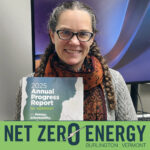Burlington’s Net Zero Energy goal is
to eliminate fossil fuel usage in heating and ground transportation.
Transitioning away from carbon emitting fossil fuels has many environmental, social and economic benefits. For example, as we move away from fossil fuels and efficiently electrify our buildings and vehicles, we’ll reduce our city’s greenhouse emissions that lead to climate change, improve our air quality and public health, reduce congestion, and have safer and more comfortable homes and work spaces. Furthermore, by producing or securing more and more electricity closer to home, NZE will keep more dollars local, essentially growing the local economy and generating more local jobs.
Read the Net Zero Energy Roadmap Read the 2024 NZE Roadmap Update
Net Zero Energy News
- January 2026 Net Zero Energy News January 2, 2026 - Get Help Paying Your Electric Bills with BED’s Energy Assistance Program As we enter 2026, we remind our customers that
- Moody’s Investors Service Affirms BED’s A3 Credit Rating December 23, 2025 - Recognizes Renewable Power, Competitive Rates, and Improved Financial Metrics
- Burlington Electric Department Announces Expansion of Energy Assistance Program December 18, 2025 - Updates Will Allow Qualifying Providers of Affordable Housing and Temporary Shelter Housing to Participate in the Program
- Burlington Electric Celebrates Net Zero Energy 2026 Calendar Contest Winners December 4, 2025 - Every year, Burlington Electric Department (BED) and the Burlington School District collaborate on the annual Net Zero Energy Calendar contest.
Net Zero Energy Podcast
The City of Burlington, Vermont’s goal is to eliminate fossil fuel usage. In this podcast series, Burlington’s Director of Sustainability Jennifer Green and her guests will be sharing ways we can all reduce our energy usage for heating, driving, and everything else we plug in.
EAN 2025 Annual Progress Report | Cara Robechek
Cara Robechek, Deputy Director and Network Manager for Energy Action Network, shares the findings in this year’s 2025 Annual Progress Report for Vermont on Energy, Affordability, and Emissions. The report provides an in-depth analysis of where Vermont stands relative to its climate commitments and energy goals. This year’s report highlights the theme of affordability.
Car-Free Living | Alicia Taylor
Alicia Taylor, Director of Community Engagement at CarShare Vermont, shares her family’s journey to being car-free. She, her husband, and two kids have found many benefits in making the switch.
Energy Education | Sophia Donforth
Executive Director for VEEP and NHEEP Sophia Donforth returns to the podcast to share her experiences over the last 4 years and the many great energy education services offered to schools by the organization in Vermont and New Hampshire.
How Can I Help?
Achieving our Net Zero Energy (NZE) goal will take all of us working to reduce our energy usage and switching from fossil fuels to renewably-sourced electricity.
Net Zero Energy FAQs
What is Net Zero Energy? What does NZE mean?
Net Zero Energy (NZE) means reducing and eventually eliminating fossil fuels. Burlington currently sources all of its electricity from renewable resources (learn where we get our energy), but ground transportation and heating generally require gasoline and natural gas, two fossil fuels. To become a NZE city, Burlington will need to eliminate fossil fuel use in the thermal and ground transportation sectors, and electrify those sectors. During our electrification process, we'll simultaneously work to reduce load through energy efficiency and grow our renewable energy portfolio.
Why is Net Zero Energy important? What are the opportunities to achieving NZE?
Transitioning away from carbon-emitting fossil fuels has many environmental, social, and economic benefits. For example, as we move away from fossil fuels, we'll reduce our City's greenhouse gas emissions that lead to climate change, improve our air quality and public health, reduce congestion, and create safer and more comfortable homes and work spaces. Furthermore, by producing or securing more and more electricity closer to home, NZE will keep more dollars local, essentially growing the local economy and generating more local jobs.
What is the Net Zero Energy Roadmap? What is it not?
Unlike a cookbook with step-by-step instructions, the Net Zero Energy Roadmap is a high-level analysis of what it will take to get to NZE by 2030. And while the Roadmap does not offer prescriptive ideas or projects on how to get to NZE, it does offer a set of strategies on how to move away from fossil fuels in the thermal and ground transportation sectors.
Will Burlington's Transition to NZE Impact BED's Rates?
Burlington Electric has not raised rates since 2009. Burlington's average residential electric rate is 15.58¢/kWh, which is 8.41% less than the Vermont average rate of 17.01¢/kWh. Thermal and ground transportation electrification offer an opportunity to reduce fossil fuel use and instead use renewable electricity to power our vehicles and heat our homes and businesses. If BED and our customers manage impacts on the grid by driving new use to off-peak periods, we can potentially put downward pressure on electric rates through strategic electrification. As Burlington advances on the Net Zero Energy path, BED would need to acquire additional amounts of renewable electricity and, eventually, invest in distribution system upgrades to poles, wires, and transformers. To minimize costs, BED will work aggressively to avoid overlap between periods of high demand (i.e. during hot summer afternoons) and high cost of electricity whenever possible. We are already working to do so through programs such as our residential EV rate and Defeat the Peak.
How will Burlington's Transition to NZE Impact my Electric Bill?
Impact on a customer's monthly electric bill depends in part on customer choice and if or how customers are able and willing to engage in NZE. For example:
- If a property owner heats with propane or oil, switching to a heat pump may result in annual energy costs that are the same or less than heating with a heat pump.
- For homes and businesses heated with natural gas, switching to a heat pump will likely raise a customer's electric bill, particularly if that heat pump also is used to provide summer cooling. For some customers, however, having the added benefit of cooling, plus the improved air quality of a heat pump, may offset higher monthly bills.
- Electric vehicles (EVs) can have a higher upfront cost, but are less expensive to maintain and operate – so can save a customer money over time. EV drivers who charge at home, during off-peak hours, pay the equivalent of about 60 cents per gallon to charge.
- Driving less, and opting for other transportation options like biking, walking, car sharing, carpooling, and public transit, can save a household transportation energy costs. (According to CarShare Vermont, it costs Vermonters over $700 a month to own a car. So, doing away with a household vehicle, and using other modes of transport, is a real cost savings.)
How Can I Help?
Whether you're a resident, business owner, someone who owns, leases or rents, there are many ways you can help with Burlington's transition to NZE, including taking advantage of BED's programs and incentives. See also our special pages with tips on saving energy:
How Can I Weigh In to Share Thoughts or Comments?
BED will be presenting the Net Zero Energy Roadmap at a City Council meeting, Burlington Electric Commission meeting, and presenting on the Roadmap at NPA meetings. Public comment during those presentations is always welcome. BED is interested in hearing from customers about the Roadmap, including how they plan to engage, and what customer constraints or challenges might hinder your involvement. By better understanding these challenges, BED will be better able to design new programs.
What about Equity? How Does the NZE Embrace Equity?
BED understands that transitioning to NZE will require input and engagement by all Burlingtonians, regardless of income, race, gender, or ethnicity. To that end, BED pledges to intentionally consider equity in creating and prioritizing programs and projects to help ensure that the NZE transition – and the technologies that will help make NZE possible -- are accessible and beneficial to all.
How is the City Leading by Example?
The City, including BED, is hard at work to lead by example. For example, BED has made changes to its procurement process to ensure it evaluates electric options for all purchases. BED already has replaced fossil fuel burning fleet vehicles with EVs, is using cold-climate heat pumps, and recently purchased two electric lawn mowers at its facility at 585 Pine Street.
The City is an active member of the 2030 District and is engaged with the energy efficiency team to identify all energy saving opportunities.
Is the NZE Roadmap the Same as our Climate Action Plan? Is It Different? If So, How?
The NZE Roadmap and Climate Action Plan (CAP) are similar but different. The Climate Action Plan uses greenhouse gas emissions as a metric. The Roadmap uses fossil fuel consumption and focuses principally on ground transportation and buildings, the two sectors most dependent on fossil fuels. CAP is about reducing emissions, and the Roadmap is about completely eliminating the consumption of fossil fuels within the City.
What Are Burlington's Biggest Challenges to Achieving Net Zero Energy?
Some of Burlington's biggest challenges include the relatively low cost of natural gas and the cost of retrofitting buildings. In order to achieve the Roadmap vision, we will need to make progress on adding cold-climate heat pumps, ground-source heat pumps, and other clean heating technologies to our buildings. While the payback on investing in a cold-climate heat pump today may be limited, some customers prefer them because they provide efficient heating and also efficient cooling. BED’s new incentive programs and other future efforts will help make these technologies more affordable. In addition to electrification, Burlington needs to see significant improvements in building efficiency. While Burlington's old buildings are historically relevant, they are not very efficient. Sufficient improvements will require going beyond traditional weatherization to engage in deep energy retrofits, which entails measures like thickening walls and roofs, and are much more expensive than weatherization. Other challenges include making electric vehicles accessible to low- and moderate-income households, and making EV charging stations accessible to renters.
What Does Beneficial or Strategic Electrification Mean?
Beneficial or strategic electrification means electrifying conscientiously and intentionally in a way that reduces fossil fuel use and manages grid impacts. The costs of meeting electricity demand are not static; during the day, when people are at work, demand for electricity is relatively low and easy to provide, but in the evening when people come home and start using all their appliances, the demand for electricity can be higher. Electrifying additional energy uses can put downward pressure on electric rates by utilizing our electric grid more effectively if we also take proactive measures to control when and how we use electricity. For example, electric vehicles and heat pump water heaters can be programmed to charge when electricity is cheap and easy to produce. Appliances like smart thermostats and motion activated lighting can prevent wasteful use of electricity.
How Will Progress Be Measured?
Starting in 2020, BED will update our annual Performance Measures Report, which is shared with our community on Town Meeting Day, to include new metrics that track our progress on fossil fuel and emissions reductions consistent with our Net Zero Energy goal.








